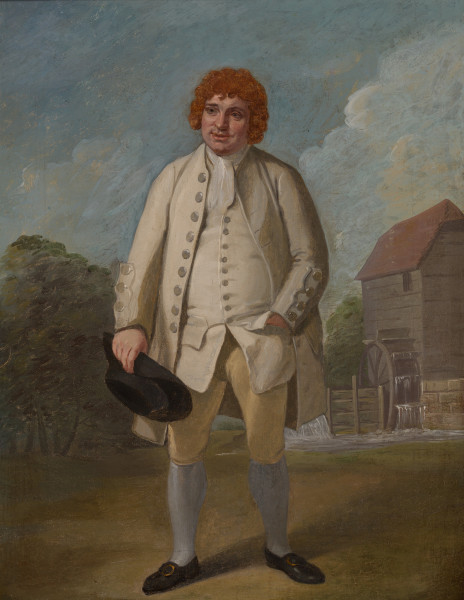Home
/
G0071
Paintings: G0071
Title
Thomas Blanchard
Technique
Oil on canvas
Subject
Character
Ralph : The Maid of the Mill
Artist
Dimensions
Height: 36.5cm
Width: 28.2cm
height (frame): 46cm
width (frame): 37.5cm
Width: 28.2cm
height (frame): 46cm
width (frame): 37.5cm
Provenance
John Bell; Charles Mathews
Other number
Mathews 374
RW/CKA 258
RW/CKA 258
Exhibition history
1833 London, Queen's Bazaar, Oxford Street, "Mr Mathews's Gallery of Theatrical Portraits" (3)
1951 London, Tate Gallery, "Pictures from the Garrick Club" (11)
1971 Northampton, Central Art Gallery, "The De Wildes" (5)
Related works
See G0072
Engraving history
J. Thornthwaite for Bell's British Library 4 January 1791, line 10.8x8 ("De Wilde del ad vivam"), pub. Bell's "British Theatre" (1797), vol 8
William S. Leney, printed for J. Bell, 29 May 1792, stipple 22.8x17.8 (inscr: "Engraved by Leney, from the original Picture which was painted from life by De Wilde, / from the Maid of the Mill by Bickerstaffe, / in the Celebrated Edition of Bell's British Theatre, which is now publishing Periodically"), with quotation "There's no harm in putting a civil question be there? Why you look as cross and ill-natured - "
The quotation on the 1792 engraving is from Act II, scene 10, in which Ralph talks to Fanny, the gipsy girl who hopes to marry him. She has been assisting Mervin in his amorous pursuit of Theodosia, and Ralph asks where he is. However, this scene takes place in front of "a view of Lord Aimworth's house, and improvements; a seat under a tree, part of the garden wall, with a Chinese pavilion over it." John Inigo Richards, who created the original scenery for “The Maid of the Mill”, painted a scene with the mill (versions: Yale Center for British Art, and Sotheby's, 27 June 1973, lot 33). The original version by Richards is probably the larger picture at Frampton Court, Gloucestershire. The text for Act I, scenes 1 to 5, calls for a rural prospect, with a mill at work. A house on one side of the stage and the barn on the other side are visible in Richards's painting, but not in De Wilde's which shows only the mill with the waterwheel and mill-pond. Blanchard as Ralph wears black shoes with gold buckles, white hose, yellowish breeches, a cream coat and waistcoat, and a white stock with flaps. At his side he holds a hat in his right hand.
Bickerstaffe's comic opera, with music selected by the author in collaboration with Samuel Arnold, was first performed at Covent Garden on 31 January 1765, when Charles Dibdin created the part of Ralph. Blanchard was playing Ralph at Covent Garden when De Wilde painted his picture. He first acted the role on 12 December 1789 and his fifth and final one on 17 April 1790.
The inscription on the original engraving suggests that the plate was taken from a drawing rather than the present painting. It is one of only four plates similarly inscribed in the second edition of Bell's “British Theatre”. There are also oil versions of the other three in the Garrick Club: G0020, G0140, and G0657. The drawing may have been G0072.
Bickerstaffe's comic opera, with music selected by the author in collaboration with Samuel Arnold, was first performed at Covent Garden on 31 January 1765, when Charles Dibdin created the part of Ralph. Blanchard was playing Ralph at Covent Garden when De Wilde painted his picture. He first acted the role on 12 December 1789 and his fifth and final one on 17 April 1790.
The inscription on the original engraving suggests that the plate was taken from a drawing rather than the present painting. It is one of only four plates similarly inscribed in the second edition of Bell's “British Theatre”. There are also oil versions of the other three in the Garrick Club: G0020, G0140, and G0657. The drawing may have been G0072.

